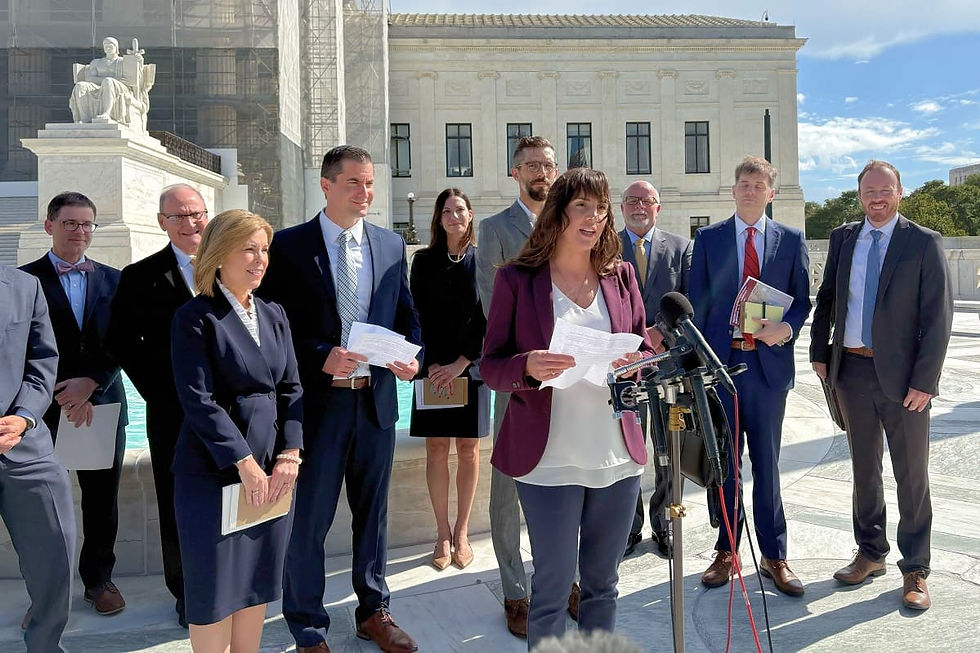When Speech Becomes “Treatment”: The Free Speech Stakes in Chiles v. Salazar
- Mathew Habib
- Oct 19, 2025
- 3 min read
Xylee Alvarez
Oct 2025
When Speech Becomes “Treatment”: The Free Speech Stakes in Chiles v. Salazar
The Supreme Court faces a defining test on whether states can ban conversations in therapy that express disfavored moral or religious views.
The question of whether or not Colorado's law banning “conversion therapy” violates the Free Speech Clause of the First Amendment was posed in court on October 7th, taking this case beyond just “therapy”. While hearing the oral argument for Chiles v. Salazar, I couldn’t help but feel that this case is truly about the fragile boundary between government regulation and the individual freedom of thought. At the center of the case is a Colorado Counselor, Kaley Chiles, who offers talk therapy to minors struggling with sexuality or gender identity. It's noted that she doesn’t use medical procedures or coercion, just plain old “conversation.” However, under a Colorado law that bans this specific type of counseling that is aimed at “changing” a minor’s sexual orientation or gender identity, her work could be punished because it promotes a viewpoint the state disagrees with.
What truly struck me was how much of this hearing revolved around the question of what TRULY counts as speech? Chiles’s attorney, James Campbell, insisted that talking with a client, regardless of the sensitivity of the topic, is speech that the First Amendment protects. But as I listened, the debate felt heavier than a typical free speech dispute; this case raised the tension between those expecting compassion and those who valued liberty. Justices Kagan, Sotomayor, and Jackson repeatedly questioned whether counseling, when conducted professionally, should be treated as a form of medical care rather than unregulated speech. Justice Jackson pointed out that once words serve as therapy, they come with a corresponding responsibility. That point stuck with me. When speech has the power to harm, it is no longer just conversation; it is conduct.
I understand entirely why Colorado passed this law. It has been made known that the idea of “conversion” therapy denounces children and does far more harm than good. It's mainly something known to harm the youth in the LGBTQ+ community, with more than 39% of LGBTQ+ youth seriously considering taking their own life without the impending pressure of conversion therapy. So, for Chiles to raise such stakes for her “free speech” feels as if there is something much deeper to her words.
That said, free speech is essential, and many may worry about letting the government decide what professionals can say. But there’s a difference between restricting ideas in public debate and setting boundaries in what is supposed to be healthcare. Therapists are individuals who hold significant power over clients who are vulnerable and seeking guidance. Using that position to suggest that someone’s identity is “wrong” or needs changing crosses the line. The efforts being made to push a belief that someone's identity needs “changing” feel less and less like free expression and much more like harm.

Kaley Chiles speaking outside of the Supreme Court after her hearing.
As I approached the end of the hearing, I felt a sense of pride knowing that states like Colorado are willing to stand up for youth dignity. Protecting minors from damaging practices isn’t censorship; it’s the compassion that many of them need without even knowing it. The First Amendment shouldn’t be twisted into a shield for harmful pseudoscience. There is always room in this country for both freedom and care, a space where shame isn’t mistaken for faith.
I predict a 4-5 decision for Colorado, with Justice Kagan writing or heavily influencing the majority opinion. The court will likely uphold the state’s rights to regulate professional therapy as conduct rather than pure speech, highlighting that protecting minors from demonstrable harm is a compelling state interest.
Sources
Oral Argument, www.supremecourt.gov/oral_arguments/argument_transcripts/2025/24-539_3f14.pdf. Accessed 19 Oct. 2025.
2024 U.S. National Survey on the Mental Health of LGBTQ+ Young People, www.thetrevorproject.org/survey-2024/. Accessed 19 Oct. 2025.
“Chiles v. Salazar.” Oyez.Org, www.oyez.org/cases/2025/24-539. Accessed 19 Oct. 2025.





Comments